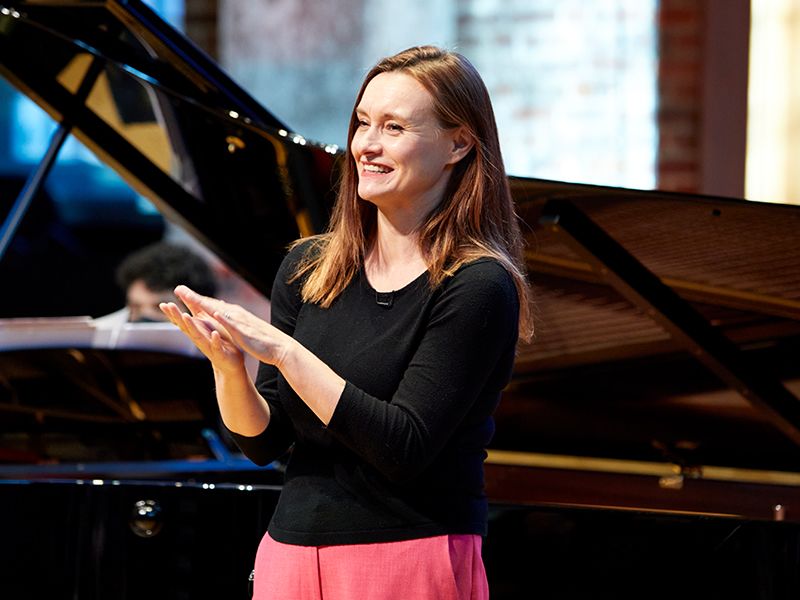LSO Discovery
Free Friday Lunchtime Concert

TODAY'S CONCERT
Dave Anderson Parade of the Politically Prudent Pigs and Rush Hour from 'Seven Double Bass Duets'
Gioachino Rossini Andante and Moderato from String Sonata No 3
George Frideric Handel arr AJ Fortuna La Réjouissance (Allegro) from Music for the Royal Fireworks
Franz Schubert arr Gustav Mahler Allegro from String Quartet No 14, 'Death and the Maiden'
Leroy Anderson Jazz Pizzicato
LSO String Experience Members
Polina Makhina violin
Olwen Miles violin
Magdalena Riedl violin
Yunxiaotan Pan cello
Ruohua Li double bass
Will Duerden double bass
Julia O'Riordan LSO viola
Rachel Leach presenter
Tom Goodman concert curator & coach
USING YOUR DIGITAL PROGRAMME
- Connect to the free hawksmoor WiFi network.
- Navigate using the menu icon (≡) at the top of the screen.
- Please set your phone to silent and don't use other apps during the music.
The LSO String Experience Scheme is kindly supported by the Barbara Whatmore Charitable Trust, the Idlewild Trust, and The Thriplow Charitable Trust.
Dave Anderson (b 1949)
Seven Double Bass Duets
✒️ 1996 | ⏰3 minutes

No 2 Parade of the Politically Prudent Pigs
No 3 Rush Hour
Dave Anderson is an American bassist and composer. His father was principal bass trombone with the Cleveland Orchestra and almost following in his footsteps, Anderson has been principal bass with Louisiana Philharmonic since 1996. Much like Luciano Berio and in the mould of Béla Bartók, Anderson wrote these duets when he found a shortage of pieces to play. He says they are written with humour because it is funny to think of the double bass as a solo instrument. Within the seven short duets he uses the whole, large range of the instrument and covers many different styles. Today we will hear' Parade of the Politically Prudent Pigs' in which ‘Jimi Hendrix and Prokofiev meet Rush Limbaugh’, and 'Rush Hour' which describes 7:30am downtown traffic, complete with taxi horns!
Note by Rachel Leach
Gioachino Rossini (1792 to 1868)
String Sonata No 3
✒️ 1804 | ⏰8 minutes

2 Andante
3 Moderato
Gioachino Rossini was born in Pesaro to a family of musicians. His father was a horn-playing slaughterhouse inspector and his mother, a singer. Rossini completed 40 operas, mostly in his distinctive bubbly, energetic style. At the peak of his fame and aged just 37, Rossini retired from music and only returned to composing very briefly in old age. He then led a lavish and notorious life full of food and became as known for his cooking as for his music – several famous Italian dishes are named after him! Rossini wrote his six String Sonatas for the unusual combination of two violins, cello and bass when he was just twelve years old. They are his earliest surviving pieces and remarkably good for someone so young. He was holidaying with an amateur bass player and they were written for the holidaymakers to perform for fun. Today we hear an arrangement of No 3, for violin, viola, cello, and bass.
Note by Rachel Leach
George Frideric Handel (1685 to 1759)
Music for the Royal Fireworks
✒️ 1749 | ⏰2 minutes

4 La Réjouissance (Allegro)
Born in Germany, George Frideric Handel studied for a law degree and took up music after his father, who objected to the pursuit of music, died. After gaining a little fame in his home, he travelled to Italy and was declared a genius by his rival, Arcangelo Corelli. He then travelled to England and, realising the potential for fame in a country with no composers of his stature, he settled in London and championed the British music scene. The Music for the Royal Fireworks suite was composed in 1749 for King George II to celebrate the end of the War of the Austrian Succession. Its first performance caused the first largescale traffic jam in central London as crowds of people gathered to see the fireworks and the fireworks themselves started a huge fire! Today we will hear an arrangement for strings created by AJ Fortuna, but the piece originally had no strings in it – apparently King George did not like ‘fiddles’.
Note by Rachel Leach
Franz Schubert (1797 to 1828)
String Quartet No 14, 'Death and the Maiden'
✒️ 1824 | ⏰ 13 minutes

1 Allegro
Franz Schubert was an incredibly prolific composer, completing over 1000 works during his short life. Born into a musical family and surrounded by cultured people, Schubert surprisingly found it difficult to make a living as a composer and relied heavily on support from his network of friends. In 1826 he was in a bad place – he had the illness which he knew would kill him, he was poor and in despair. Despite this he kept writing and the form of the string quartet became his place to express emotions. Death and the Maiden is the name often given to his 14th String Quartet after a melody in the second movement which is borrowed from his song of the same name. In 1896 the great Gustav Mahler started an arrangement of the work for string orchestra but left it unfinished, covered in copious notes and suggestions. It was finally finished in 1984 at the request of Mahler’s daughter Anna.
Note by Rachel Leach
Leroy Anderson (1908 to 1975)
Jazz Pizzicato
✒️ 1938 | ⏰2 minutes

Leroy Anderson was an American composer famous for his witty, light-classical pieces. Film composer John Williams called him ‘the greatest American master of light orchestral music’ and in the 1950s his music appeared on many US TV shows and was (and still is) a regular feature of Boston Pops concerts. Jazz Pizzicato was the first piece Anderson wrote for the Pops after being spotted by their conductor Arthur Fiedler. It was written in 1938 and years later Anderson said it was the one that ‘got me started and got me published’. It features pizzicato (plucking) throughout. Players are also asked to slap their strings rhythmically and ‘blue’ the notes by sliding between them (whilst plucking at the same time!).
Note by Rachel Leach
About the Artists

Rachel Leach
presenter
Rachel Leach was born in Sheffield. She studied composition, and her music has been recorded by NMC and published by Faber. She has won several awards including, with English Touring Opera (ETO), the RPS award for best education project 2009 for One Day, Two Dawns.
Rachel has worked within the education departments of most of the UK’s orchestras and opera companies. The majority of her work is for the London Symphony Orchestra and the London Philharmonic Orchestra. Rachel has written well over 20 pieces for LSO Discovery and 15 community operas, including seven for the English Touring Opera.
Increasingly in demand as a concert presenter, as well as presenting the LSO Discovery Free Friday Lunchtime Concert series, she regularly presents children’s concerts and pre-concert events for the LSO, LPO, Philharmonia Orchestra, Scottish Chamber Orchestra, Royal College of Music and Royal Northern Sinfonia.
About the LSO String Experience Scheme

Established in 1992, the LSO String Experience scheme enables young string players at the start of their professional careers to gain work experience by playing in rehearsals and concerts with the LSO. Currently more than 15 members of the LSO came to the Orchestra via the scheme.
The scheme auditions students from the London music conservatoires – Royal Academy of Music, Royal College of Music, Guildhall School of Music & Drama, and Trinity Laban College of Music and Dance – and ten students per year are selected to participate in the scheme. Participants are treated as professional 'extra' players (additional to LSO members) and receive fees for their work in line with LSO section players. They are given other opportunities during their year on the scheme, including tickets to LSO concerts, exploring string orchestra repertoire side-by-side with LSO players, and chamber music coaching. The participants are guided throughout the year by the five LSO mentors – Harriet Rayfield and Iwona Muszynska (violins), Robert Turner (viola), Ève-Marie Caravassilis (cello) and Tom Goodman (double bass).
Auditions for the 2024/25 scheme will take place in November. For further details, please visit the LSO website.
LSO String Experience Scheme 2023/24
Violins
Victoria Lewis (Guildhall School of Music & Drama)
Polina Makhina (Royal College of Music)
Olwen Miles (Royal Academy of Music)
Magdalena Riedl (Royal Academy of Music)
Violas
Vanessa Hristova (Royal College of Music)
Hattie Quick (Royal College of Music)
Cellos
Yunxiaotan Pan (Royal Academy of Music)
Kosta Popovic (Guildhall School of Music & Drama)
Double Basses
Will Duerden (Royal College of Music)
Ruohua Li (Royal College of Music)
Next Friday Lunchtime Concert
Friday 25 October 2024
Guildhall Jazz Singers
Scott Stroman director
Rachel Leach presenter
This Friday Lunchtime Concert will feature performances from the Guildhall Jazz Singers, a one-to-a-part vocal group specializing in close harmony, from jazz classics by the Singers Unlimited and Swingle Singers, gospel and pop, to music created for and by the group's members. This is a lively and talented group that over the years has included numerous singers now leading the international scene, from Cleveland Watkiss and Stacey Kent to Brigitte Beraha, Luca Manning and many more.



